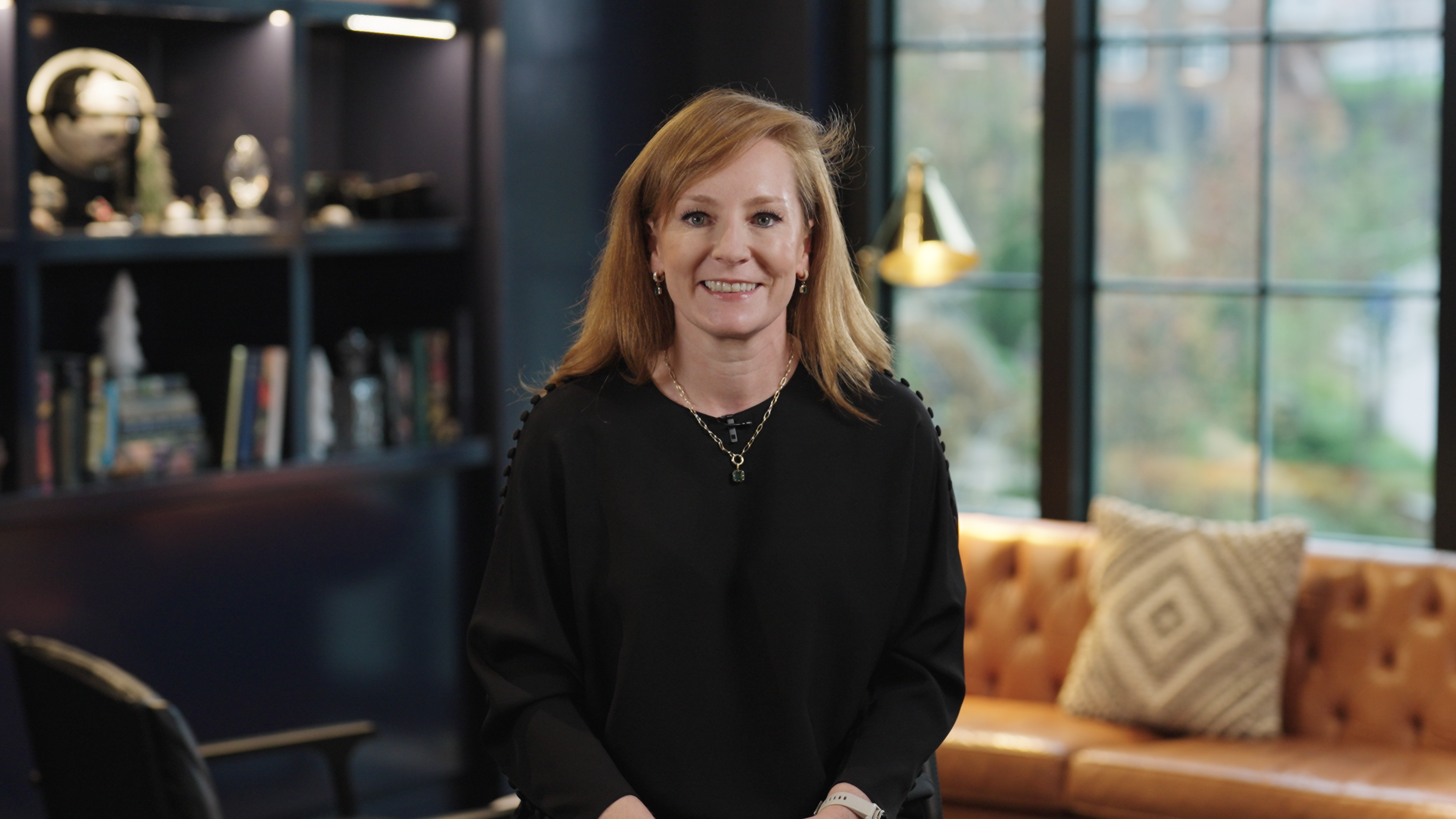
BlackRock’s Kate Moore Sees ‘Sticky’ Inflation, Market Volatility Ahead
By Lauren Foster
Buckle up investors. It’s going to be a bumpy ride.
As U.S. markets hit record highs and inflation data sends mixed signals, investors are navigating an increasingly complex landscape heading into the second Trump administration. Kate Moore, head of thematic strategy at BlackRock, the world’s largest asset manager with $11.5 trillion in assets, warns that markets are likely to see ups and downs in early 2025 rather than continuing their steady rise.
“We can expect big changes in both the economy and the markets as we go into 2025,” Moore said on the sidelines of the annual University of Virginia Investing Conference on the Darden School of Business Grounds, hosted by the Richard A. Mayo Center for Asset Management.
Companies Hold Back as Policy Questions Loom
On the campaign trail, president-elect Donald Trump promised to slash taxes and government regulations, slap tariffs on imports, freeze climate-related regulations, and order the largest deportation of immigrants in American history. Now investors are waiting to see whether he follows through — especially after Republicans clinched full control of Congress.
Sweeping policy changes could affect economic growth, inflation and market performance.
“I’m going to be watching very closely how companies think about capital expenditure given the new administration,” said UVA alumna Moore. “Most companies don’t know what to expect, so I would expect a slower pace of spend and investment in the first part of 2025.”
When companies hold back on spending, the economy tends to slow down, potentially leading to a recession. Companies typically show predictable behavior during presidential election years, pausing major investments and hiring in the latter half of the year while awaiting election results. Once a new president’s first year begins and companies understand the new administration’s policies and regulations, they usually resume spending and hiring.
But this pattern may not hold true in the current cycle as many companies are waiting to see what happens on a number of fronts before they make decisions, said Moore (Col ’99).
“That means we’re up for a more volatile growth environment in the first part of the year, but it may be an interesting trading and investing environment,” she added.
Inflation is Stickier Than Many People Hoped
While many people believe inflation has been vanquished and will continue to move gradually downward to meet the Fed’s 2% target, there are key risks to this view.
The latest data from the Bureau of Labor Statistics showed that consumer prices climbed 2.6% in October from a year earlier. The figure was in line with expectations and above September’s 2.4%. US producer prices also picked up in October, rising 0.2% on a monthly basis.
Both reports indicated more stubborn inflation in core prices, serving as a reminder that the Fed’s inflation fight isn’t over.
“We got two very important pieces of inflation data, both suggesting that current consumption trends are pushing up prices just at a time where many people were expecting policy easing to accelerate,” said Moore. Prices “will be stickier for longer” and market expectations for Federal Reserve easing may be “overdone,” she added.
The Fed’s policy-setting committee meets again in mid-December. While policymakers are expected to lower rates by a quarter point, Fed officials have made it clear that a cut is not guaranteed.
Economic Reality vs. Voter Perception
In the run-up to the election, there was a lot of focus on inflation. Exit polls showed voters were deeply concerned about America’s economy.
But there’s a mismatch between perception and reality.
“The recent performance of our economy has been remarkably good, by far the best of any major economy in the world,” Jerome H. Powell, the chair of the Federal Reserve, told business leaders in the Dallas area.
Moore is in Powell’s camp and does not see a recession on the horizon. “I happen to agree very much with Chair Powell that the economy is in very good shape right now, despite how some people feel and how that may have been expressed at the polls,” she said. “There’s plenty of data across income cohorts suggesting that not only have wages been strong, but all segments of the consumer are spending.”
Record Highs Don’t Signal Smooth Sailing
The U.S. stock market has been on a tear lately, hitting record highs the day after Trump’s win before paring back some gains.
Despite high valuations, Moore is optimistic about corporate fundamentals. “I’m not bothered by the fact that multiples are at a higher level than long-term averages,” she said. “The companies that have outperformed have produced huge earnings and are basically cash-flow machines.”
But she cautions investors it won’t be smooth sailing next year: “I think we’re in for some volatility in the near part of the early part of 2025, and some great, interesting trading opportunities. But I don’t think we should assume it’s a straight line from here.”
Trump’s Trade Could Upend the Global Economy
Trump has said he intends to be aggressive with tariffs and has threatened a 10% tariff on all imports and a 60% tariff specifically on Chinese imports. How much of this is bluster and posturing versus a real possibility?
“We should take Trump at his word that tariffs and trade are the primary objectives in his first part of his next term,” Moore said in response to conference moderator and fellow Hoo Tyler Mathisen (Col ’76).
Higher tariffs tend to push up inflation and often invite retaliation from other countries, including China, which could slow global trade.
Where to Invest: Three Key Themes for 2025
Looking ahead, Moore emphasized the importance of identifying “policy insensitive trades” — investments that can perform well regardless of the political environment. This strategic approach reflects the complex interplay between policy uncertainty and market dynamics that investors will need to navigate in 2025.
Moore likes three main sectors:
- Cybersecurity software, “a big and enduring theme.”
- Financials and banks, which will fare well in a friendlier regulatory landscape.
- Companies that are effectively leveraging technology and data across various industries.
Looking over the next five to 10 years, Moore is very bullish on U.S. large caps stocks, even though they are trading at 22 times forward earnings. Why?
“I have a mantra: ‘Do not bet against US corporate resiliency in any environment, whether it’s regulatory changes, tariffs, labor market shifts,” she told the audience. “We’ve seen US companies adapt consistently over the last few decades, and they manage to the bottom line. Invest where earnings are. US companies are in the best position to put up earnings.”
AI: Data Ownership Will Separate Winners from Losers
Artificial intelligence (AI) has been a big investing theme ever since ChatGPT launched in late 2023 as a free service, dazzling the world with its ability to answer questions and create original materials.
Not surprisingly, Moore is bullish on AI’s potential.
“I am a true believer that it’s going to be revolutionary across all types of industries,” she told Darden Report. Drawing from personal experience, she added, “We are using a huge suite of AI tools — it has increased my productivity, my understanding of the markets, and made me much more efficient.”
Moore said data ownership will be crucial in determining corporate success. “The companies that own data or have access to unique data sets are likely to be the winners in this new world,” she added. “I think we’re going to see great differentiation in industries between competitors, those that have access to great data and great technology and those that are left behind.”
The University of Virginia Darden School of Business prepares responsible global leaders through unparalleled transformational learning experiences. Darden’s graduate degree programs (MBA, MSBA and Ph.D.) and Executive Education & Lifelong Learning programs offered by the Darden School Foundation set the stage for a lifetime of career advancement and impact. Darden’s top-ranked faculty, renowned for teaching excellence, inspires and shapes modern business leadership worldwide through research, thought leadership and business publishing. Darden has Grounds in Charlottesville, Virginia, and the Washington, D.C., area and a global community that includes 18,000 alumni in 90 countries. Darden was established in 1955 at the University of Virginia, a top public university founded by Thomas Jefferson in 1819 in Charlottesville, Virginia.
Press Contact
Molly Mitchell
Senior Associate Director, Editorial and Media Relations
Darden School of Business
University of Virginia
MitchellM@darden.virginia.edu





